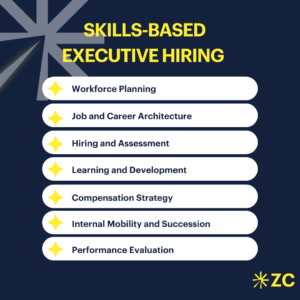As the demands on leadership continue to change, many organizations are rethinking how they identify and promote senior talent. The traditional executive search model—focused on previous job titles, academic credentials, and years of service—no longer reflects what’s required for success. A recent global survey found that 62% of executives believe a candidate’s résumé often fails to reflect their true capabilities—sometimes overlooking potential, and other times overestimating readiness.
This is why a growing number of organizations are embracing a skills-based hiring approach—especially for critical leadership roles.
Rather than relying solely on where someone has been or what their résumé includes, skills-based hiring asks: What can this person do today, and what could they do tomorrow?
Why Traditional Executive Search Is Falling Short
Resumes reflect the past, but leadership today is about readiness for what’s next. With core skills evolving faster than ever, experience alone no longer signals capability.
According to recent global research:
- 89% of leadership development professionals say that preparing for the future of work means investing in skill-building.
- 54% of organizations are actively prioritizing reskilling and upskilling as a response to persistent leadership and capability gaps.
- Leaders with high learning agility are 5x more likely to be promoted into senior roles—yet this trait rarely appears on a CV.
What It Means to Hire for Skills
Skills-based hiring doesn’t mean ignoring experience—it means looking past surface credentials to evaluate the real capabilities a person brings: their decision-making under pressure, strategic insight, collaborative ability, resilience, and capacity to learn.
This is especially powerful in executive search hiring, where so much of a role’s impact depends on context-specific challenges. Instead of asking whether a candidate has held a specific title, the focus shifts to whether they have demonstrated the necessary leadership behaviors to solve the organization’s unique challenges.
Seven Ways to Operationalize Skills-Based Executive Hiring
- Workforce Planning
Replace generic headcount planning with capability mapping. Define which leadership skills your business needs now and in the near future, and identify whether to build, hire, or contract for those capabilities.- 74% of HR leaders say their organizations are shifting from role-based to skills-based workforce planning, recognizing that traditional headcount models no longer align with the pace of business change.
- Job and Career Architecture
Redefine executive roles around business-critical capabilities rather than hierarchy. This opens new pathways to leadership for candidates with adjacent or non-linear career histories—and better reflects how work is actually evolving. - Hiring and Assessment
Use structured, behavioral interviews, executive simulations, and competency-based evaluation frameworks to assess future potential—not just historical performance.- Nearly 90% of CEOs now go through formal leadership assessments before being hired, as organizations increasingly rely on behavioral evidence, not just track records, to predict success in new contexts.
- Learning and Development
Build agile leadership pipelines by identifying adjacent skills, fostering cross-functional exposure, and enabling stretch roles. Focus on learning velocity as a predictor of success in evolving roles.- At Zavala Civitas, we place a strong emphasis on learning agility and growth trajectories—our test, Talent 7, helps organizations not only evaluate current capabilities but also understand how leaders will evolve and scale with the demands of the role.
- Compensation Strategy
Reward leaders for high-impact skills—not just job level. This enables strategic use of compensation budgets to retain critical capabilities and attract forward-ready talent.- More than 75% of public companies now include long-term incentive schemes (LTIs) as a core part of executive compensation, aligning rewards with future-focused capabilities like innovation, digital transformation, and resilience.
- Internal Mobility and Succession
Promote based on readiness and capabilities, not tenure or current role alone. A skills-first lens makes succession planning more data-driven, equitable, and aligned with long-term strategy. - Performance Evaluation
Expand performance reviews to include skill application and growth. Assess how leaders deploy their capabilities, develop others, and contribute to long-term business agility.
An Illustrative Example
Consider Elise, a senior regional director at a mid-market retail brand. Though she didn’t hold a C-level title, she had led enterprise-wide digital change, revitalized talent strategy, and improved EBITDA performance by double digits. Her career path wasn’t traditional—but her capabilities were exactly what a global lifestyle brand needed in its Chief Commercial Officer.
Recognizing her value required looking beyond her résumé and understanding her leadership skill set in context. A traditional executive search might have missed her. A skills-first approach didn’t.
Looking Ahead: Executive Search for a New Era
As organizations face mounting pressure to innovate, transform, and future-proof their business, the ability to identify executive talent based on skills and potential—not just on papers—will become a strategic differentiator.
Skills-based hiring doesn’t reject experience; it reframes how value is recognized. It puts capability, adaptability, and impact at the center of leadership decisions—exactly where they belong.
Contact us to find the right leadership talent for your organization









